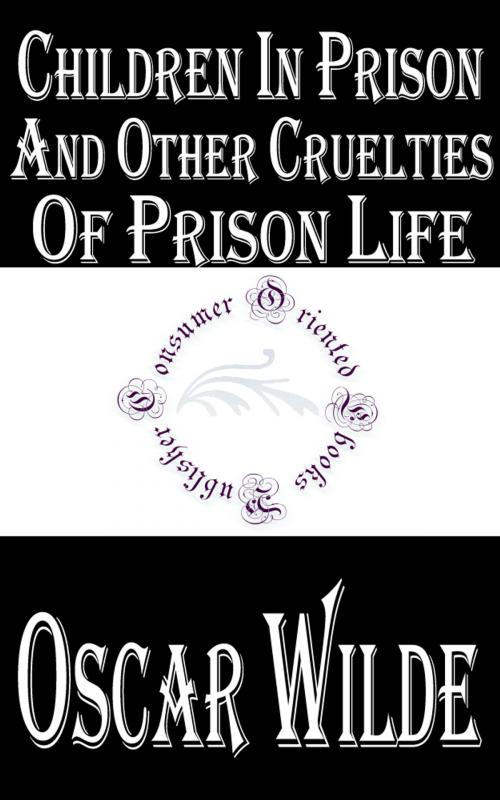Children in Prison and Other Cruelties of Prison Life
Nonfiction, Social & Cultural Studies, Social Science, Crimes & Criminals, Penology, Fiction & Literature, Essays & Letters, Classics| Author: | Oscar Wilde | ISBN: | 1230000299749 |
| Publisher: | Consumer Oriented Ebooks Publisher | Publication: | February 13, 2015 |
| Imprint: | Language: | English |
| Author: | Oscar Wilde |
| ISBN: | 1230000299749 |
| Publisher: | Consumer Oriented Ebooks Publisher |
| Publication: | February 13, 2015 |
| Imprint: | |
| Language: | English |
"Children in prison and other cruelties of prison life" is a letter that Oscar Wilde wrote to the editor of the London Daily Chronicle after a warder (guard) in the prison in Reading (one of the prisons where Wilde himself was incarcorated) was dismissed after having fed a starving child that was imprisoned. Feeding the children who were in prison was against regulations.
Wilde writes about cruelty towards children in prison and argues that children under 14 should not be imprisoned, which means that there were children younger than 14 in prison at the same time as him. He writes some stories telling about the kindness of the prison guard that was dismissed. He explains how cruelty is a part of the prisonsystem, while kindess is not. He also justifies the behavior of the guards in this way:
"Authority is as destructive to those who exercise it as it is to those on whom it is exercised. It is the Prison Board, with the system that it carries out, that is the primary source of the cruelty that is exercised on a child in prison. The people who uphold the system have excellent intentions. Those who carry it out are humane in intention also. Responsibility is shifted on to the disciplinary regulations. It is supposed that because a thing is the rule it is right."
Wilde especially criticizes that the children were being kept in solitary confinement most of the day which he says was the worst thing they could have done since being around other people could have made their time in prison bearable.
Moving away from the children, Wilde also focuses on how the prisons have been known to drive people insane and he gives an example of a man who he saw as he deteriorated into insanity.
Wilde's overall idea expressed in this letter is: "It is not the prisoners who need reformation. It is the prisons."
Wilde's arguments are well formulated, there is a lot of emotion behind this letter and his views are backed up by his own personal experiences in prison. This letter brings up an issue that is still debated today; should we put juveniles in prison?
"Children in prison and other cruelties of prison life" is a letter that Oscar Wilde wrote to the editor of the London Daily Chronicle after a warder (guard) in the prison in Reading (one of the prisons where Wilde himself was incarcorated) was dismissed after having fed a starving child that was imprisoned. Feeding the children who were in prison was against regulations.
Wilde writes about cruelty towards children in prison and argues that children under 14 should not be imprisoned, which means that there were children younger than 14 in prison at the same time as him. He writes some stories telling about the kindness of the prison guard that was dismissed. He explains how cruelty is a part of the prisonsystem, while kindess is not. He also justifies the behavior of the guards in this way:
"Authority is as destructive to those who exercise it as it is to those on whom it is exercised. It is the Prison Board, with the system that it carries out, that is the primary source of the cruelty that is exercised on a child in prison. The people who uphold the system have excellent intentions. Those who carry it out are humane in intention also. Responsibility is shifted on to the disciplinary regulations. It is supposed that because a thing is the rule it is right."
Wilde especially criticizes that the children were being kept in solitary confinement most of the day which he says was the worst thing they could have done since being around other people could have made their time in prison bearable.
Moving away from the children, Wilde also focuses on how the prisons have been known to drive people insane and he gives an example of a man who he saw as he deteriorated into insanity.
Wilde's overall idea expressed in this letter is: "It is not the prisoners who need reformation. It is the prisons."
Wilde's arguments are well formulated, there is a lot of emotion behind this letter and his views are backed up by his own personal experiences in prison. This letter brings up an issue that is still debated today; should we put juveniles in prison?















